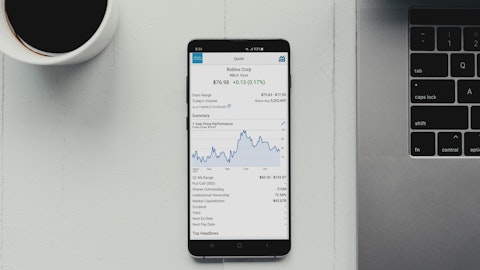The other thing to note is that these deals, as we’ve talked about in the past, are generally fixed-fee deals. It’s our objective over time to move these deals to or towards being variable. We know that’s not going to all happen in one renegotiation across the board, but we’ll be working towards that end. And obviously, as deals move variable, the growth curve would be smoother and in line with monetization and consumption growth, whereas with fixed–fee deals, it’s more of a stair step and you try to capture the expected growth in the platform within a fixed-fee over that period of time. So, we’ll be working each negotiation and seeing what we can accomplish there. And the last thing I would say is Web3. Web3 is an emerging category that we’re actively driving in market experiments.
Steve talked about the experiment we’re doing in the Sandbox now with others in flight. We see that as an area that over time is quite promising, and we think is going to be a contributor to the long-term growth of our new digital revenue. Hope that helps, Ben.
Benjamin Swinburne: Yes, absolutely. Thanks, everybody.
Operator: Thank you. Our next question comes from the line of Jason Bazinet with Citi. Your line is now open.
Jason Bazinet: I just had one quick question regarding your calendar year, or your reporting schedule for next year, because I think you guys are shifting from that sort of 53-week that happens every four years, to something more normalized. So, can you just help us as we think about modeling €˜23 and beyond, where we’ll see sort of the greatest distortion? Is it in the fourth quarter of next year? Is that the right answer, and then everything gets smooth after that?
Eric Levin: Jason, thank you. Good – I’m glad you hit on that. Good question. It’s an important one. So, yes, we’ve now shifted to calendar quarters. And so, we’ll see the main real impact in fiscal Q1 of €˜23. We disclosed that in fiscal Q1 of €˜22, we had kind of that extra week. As there’s a 53rd week, you get an extra week in one quarter. That was in Q1 of ’22. So, that will be a comparative item in Q1. But the rest of – for the following quarters in Q – I’m sorry, in fiscal €˜23, we’ll expect a consistent year and year comparison with the same number of weeks. But in Q1, we will have that to address, and we disclosed that last year, and we’ll continue to make sure we’re careful about that when we report Q1 results.
Jason Bazinet: Okay, thank you very much.
Operator: Thank you. Our next question comes from the line of Kutgun Maral with RBC Capital Markets. Your line is now open.
Kutgun Maral: Good morning, and thanks for taking the questions. Two, if I could. So, first, Steve, congratulations again on a long and successful run at WMG. If I could follow up on the question earlier and maybe ask it a bit differently. As you reflect back on the last two and a half years following the IPO, are there any parts of the story that you feel remain misunderstood, or at least underappreciated by investors? And second, for Eric, on recorded music streaming revenue, the 10.4% underlying growth was particularly strong, and it certainly seems to be ahead of your peers. I’m not expecting multiyear guidance, and I know the ad-supported piece remains uncertain, but can you help frame the puts and takes for 2023 a bit, and maybe update us on your longer-term expectations, specifically around the subscription front?
You had very attractive low teens growth in the fourth quarter. Is that a good benchmark heading into €˜23? Could it be higher given Apple Music, or are there offsets we should be mindful of? Thanks.





